Often people forget that guitar frets do not last forever. When buying a new guitar, we tend to forget that the frets will wear off in a few years, and we’ll have to replace them. So what to look for, and how to prevent them from wearing out too quickly.
So how long do guitar frets last? Frets can last anywhere in a range of several years to decades. It depends on the fret’s type and material, the type of strings you use, and your playing style, meaning your fretting hand technique. The harder the material is, the longer the frets will last. On the other hand, if you fret the strings harder, they’ll wear off sooner.
Let’s break down those factors, so you’ll better understand what goes into the equation. Is it better to have a harder material on your frets, so they’ll last longer, or will softer material be more of your liking?
Do Some Frets Wear Out Quicker Than The Others?
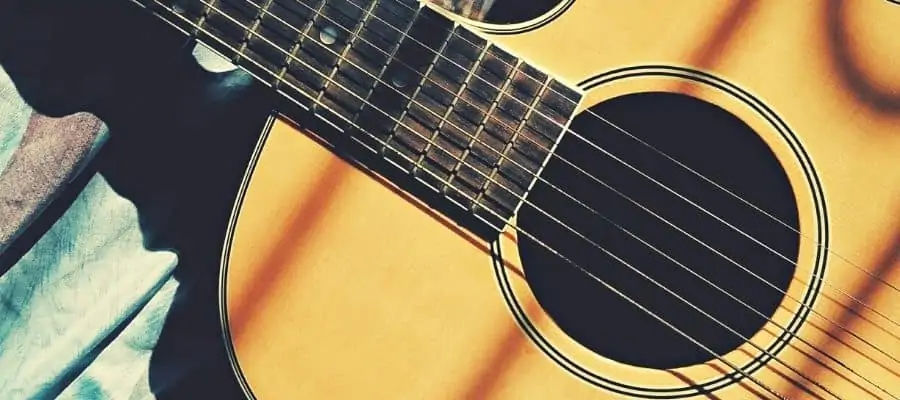
The answer is yes, and some do wear out quicker than others. To explain, we must get familiar with the material most frets are made of.
Brass Frets
Brass frets are not as common as they were in the past. They were mainly preferred on classical guitars with softer strings. As these frets are quite soft, they can not be used in modern acoustic or electric guitars.
Today, you can still find brass frets in classical guitars with nylon strings. Often budget guitars from overseas use brass frets due to the low cost of the material.
Nickel Silver Frets
Nickel Silver became the industry standard decades ago and became the first choice of guitar brands, manufacturers, and luthiers. The material actually consists of 18% nickel and 80% copper. Nickel Silver frets can be found on most guitars, including electric guitars, acoustic guitars as well as basses.
The nickel-silver combination is highly durable and is great to serve you for years. It is a hard material but not too hard to add a brash, brittle, or any kind of noise to your guitar.
Jescar’s EVO Fret material
Jescar’s EVO Fret material is actually the combination of copper and titanium. They are a relatively new way of producing frets, and the material is harder than nickel silver but softer than stainless steel. This balance makes the EVO frets less susceptible to wear and tear while maintaining tonal quality.
Also, for someone with a nickel allergy, they are recommended.
Though they are not new material, they weren’t known, but nowadays more and more small manufacturers and luthiers are sware by them and use them on their builds.
Stainless Steel Frets
Stainless Steel is arguably the best material for frets, thanks to its outstanding hardness and tonal quality. They are the most durable frets, but the hardness can cause the strings to wear out faster.
Many guitarists like stainless steel frets as they add a bit of brightness to the tone of their instruments. Some stainless steel frets are pure stainless steel, while other is a combination of nickel, silver, and stainless steel.
The downside of the SS frets is they are tough on tools, so manufacturers are not keen on them. So most of the major brands still prefer to use Nickel frets on the production guitars.
There are some exceptions, but it is more likely you won’t find them on Fender, Gibson, on Paul Reed Smith guitars. More likely on guitars produced on a smaller scale, such as Suhr, and with more modern-oriented manufacturers who take pride in listening to what modern guitarists want and need, such as Harley Benton or Cort guitars.
Does Bigger Frets Last Longer?
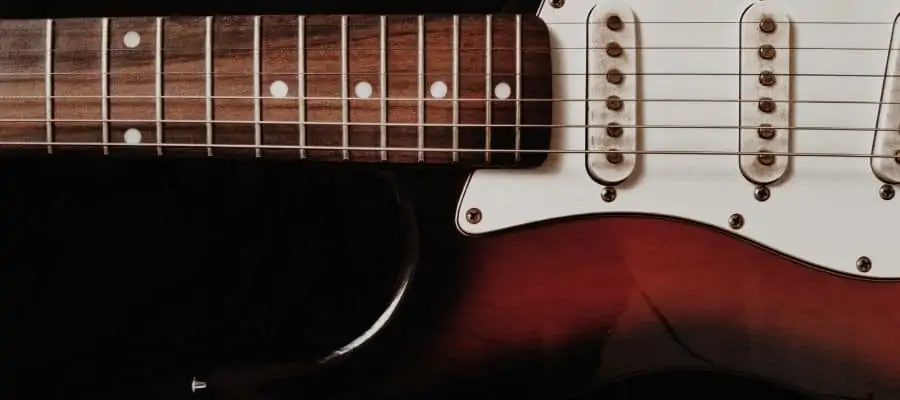
Not necessarily; like in other things in life, bigger does not always equal better. Earlier in the article, I mentioned there are different kinds of materials frets are made of, But there are also differences in shapes and sizes.
Today the fret wires are produced by different producers, which is why different measurements for different sizes. The most famous producer is Dunlop, probably you are familiar with. Dunlop Frets can be found on most medium to high-end guitars. They have up to 20 different fret wire sizes, but the most common and most used are these 5 fret sizes;
6230-Vintage
The smallest size in fret wire. They were used on vintage guitars, including early, now sought-after Fender guitars. That’s why Dunlop and others refer to 6230 as vintage, even though they are still producing them.
6105-Narrow And Tall
These frets are some of the most popular ones in the fret world. The reason behind this is the ratio between the width and the height of the frets. They follow the steps of the vintage frets and blend the positive sides of both vintage and larger modern frets.
6150-Vintage Jumbo
They are not as popular as frets noted above. Compared to them, they are much wider but not as tall as the two mentioned before. They are quite the opposite, beating short and wide.
6130-Medium Jumbo
They have dimensions sit between 6105 and jumbo 6100. Recently they are getting more and more popular, as modern manufacturers use them in their production guitars
6100- Jumbo
Like vintage jumbo, jumbo frets are wider than the frets on most guitars. Contrary to the vintage jumbo frets, 6100-Jumbo frets are quite tall, making them the largest frets around.
As we see above, different fret sizes are used for different reasons. 6100 Jumbo frets are the favorite of players who use heavier gauge strings so that the frets would last longer. Vintage guitar fans would never put jumbo frets on their prized vintage instruments, and their choice is 6230 vintage fret size.
Does this mean that they are smaller, and ones are more likely to lass much less? Well, no, it depends on the strings put on a guitar.
The heavier gauge would be harder on the frets. But it also depends on the playing style of the player. For example, Kenny Wayne Shepard uses heavier strings and jumbo frets, and it is more likely that he’ll wear his frets faster than, let’s say, Mark Knopfler, who uses lighter gauge strings and vintage frets on his guitars because playing style of KWS is much more aggressive than Mark is.
So the bottom line is that a small fret does not mean less fret life on them. Furthermore, there are some other aspects to take into account when talking about the lifespan of frets.
Can humidity affect the lifespan of frets?
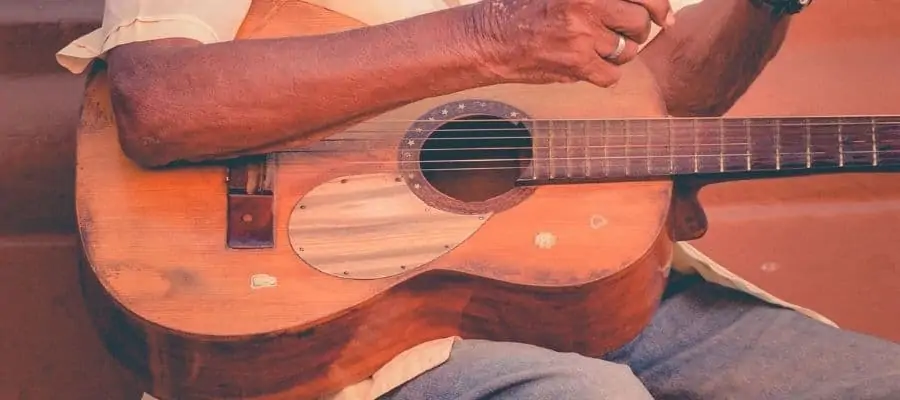
The highest risk regarding the humidity is that the guitar necks start to shrink when the humidity is too low. The reason behind this is that the guitar necks are made of wood, while the frets feature different materials that are less susceptible to damage from humidity in general.
Whether the frets are stainless steel, nickel silver, or copper, they are quite resistant to humidity compared to wood. Wood shrinks much more compared to these materials. This issue leads to a serious problem called the fret sprout. And this happens when the wood of the neck shrinks because of low humidity.
The result is a guitar with sharp fret ends hanging over the neck. These guitars are barely playable, but by sanding the frets, they can work well again.
Are Capos Bad For Your Frets?

The frets wear out more quickly if you use capo often. If you play the capo mainly in the same position, this is pretty bad for the frets because of the high tension of the strings caused by the capo against the frets.
There are adjustable-tension capos which you can tighten or loosen according to your needs. These reduce the impact on the frets when the tension is loosened. The clamping pressure gets low, which leads to frets to live longer without wearing out.
But, the difference depends on your adjustments, and it is not certain that any significant difference will be apparent as you need a limit of clamping force on the strings to play clean notes. In any case, it is better to use adjustable-tension capos than regular capos.
Are Slides Bad For Your Frets?
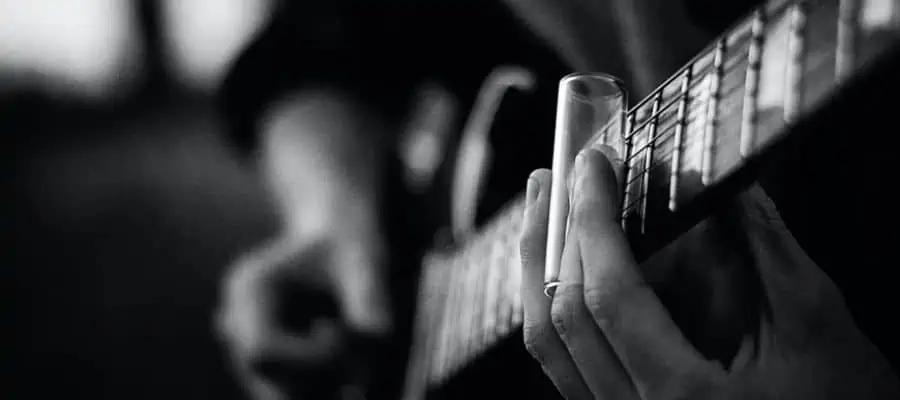
Frets wear out faster when guitarists often play their guitar with slides. The slides increase the weight on the frets, causing a high pressure on guitar frets. So, just like in the case of capos, the frets end up wearing out faster than normal.
For regular slide guitar players, the maximum lifespan of frets is a few years. The quality and the material of the slide are quite important in the lifespan of frets. Good bottle slides treat the frets kindly as they are smoother than others. Metal slides or glass bottleneck slides use higher pressure on frets.
Can One String Material Wear Out Frets More Than Others?
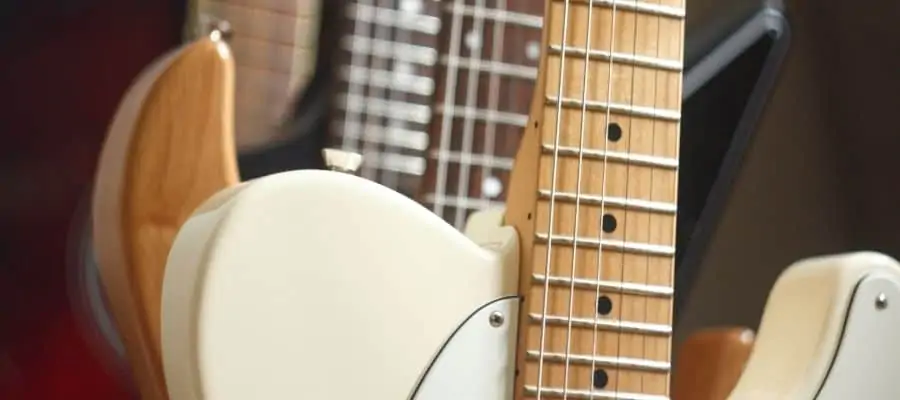
The answer is yes. Strings, whether for electric guitar, acoustic guitar, basses, or any other instrument, can be made from various metals as well.
Many ‘plain steel’ strings found in electric and acoustic sets are manufactured using high carbon steel. Steel is a harder material than the Nickel Silver frets found on many guitars nowadays.
As a result, you’ll find that plain strings will cause gradual wear to a ‘softer’ fret. If you look at a guitar that shows signs of fret wear, you may notice that there tends to be more wear on the treble side underneath the plain strings.
This is most noticeable on acoustic guitars, where players chord in the first positions, not necessarily going down the scale soloing like on electric guitar.
So that’s where the wear is most noticeable on the first 3. or 4. frets on the first three strings.
On the other end, wound strings can be either Nickel for electric guitars or Bronze and Phosphor Bronze for acoustic guitars.
Because they are thicker and softer material, they won’t wear the frets as much.
Is It Fretting Hand Technique Important In Frets Longevity?

Yes, your playing style is one of the most important things to put in an equation when talking about string wear.
The frets will wear out faster when you often use bends on your playing. Each bend damages the frets as they brush over the surface of the fret with the string.
Additionally, when you pluck a string at a certain fret, it will put pressure on the particular place on the fret’s surface. But, when you make a bend, you put that pressure on a larger area on the fret’s surface as the string travels on the fret.
However, do not let this issue keep you away from making bends. It is just a fact that shortens the life of your frets slightly, but bending is a key part of playing guitar, and there is nothing that should stop you from playing bends. You can change your frets later.
Are Coated Strings Bad For Your Frets?
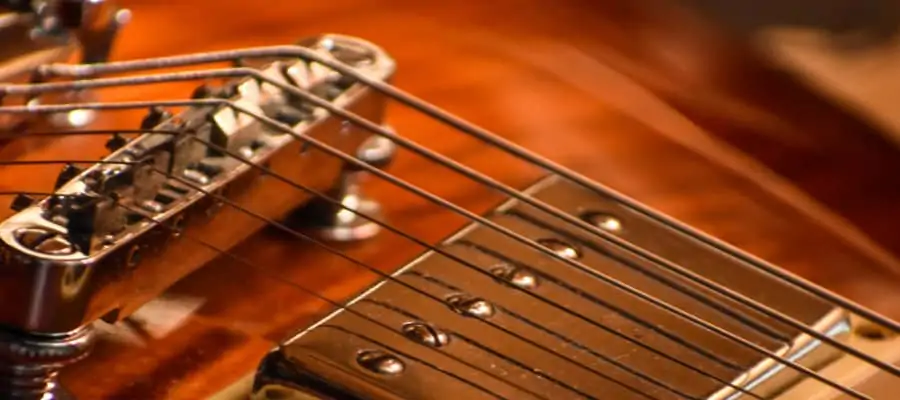
No, they are not. There is an ongoing debate that the strings with coating film on them from the manufacturers such as Elixir and Cleartone have a bad impact on your guitar fret life, even if your guitar is equipped with stainless steel frets.
This is partially true. It’s due to the effect of coating on the plain strings because they became stiffer, so they are harder on the frets.
But again, here in the equation, we have to take your playing style cause if you don’t grip too hard, the impact on your frets isn’t really different from when playing uncoated strings.
And that coating that protects strings from getting rusty and corroding over time certainly helps to prevent the rust get on your frets as well.
Can Hand Sweat Be Bad For Frets?

Yes, it’s another thing to consider. The sweat that comes from your hands to the fretboard when playing your guitar isn’t the best friend of your frets.
As for guitar strings, the same is for your frets. Moisture from your fingers can cause corrosion on the frets.
Rust on your frets is an enemy of your guitar playing and your fret life.
How Many Times Can A Guitar Neck Be Refretted?
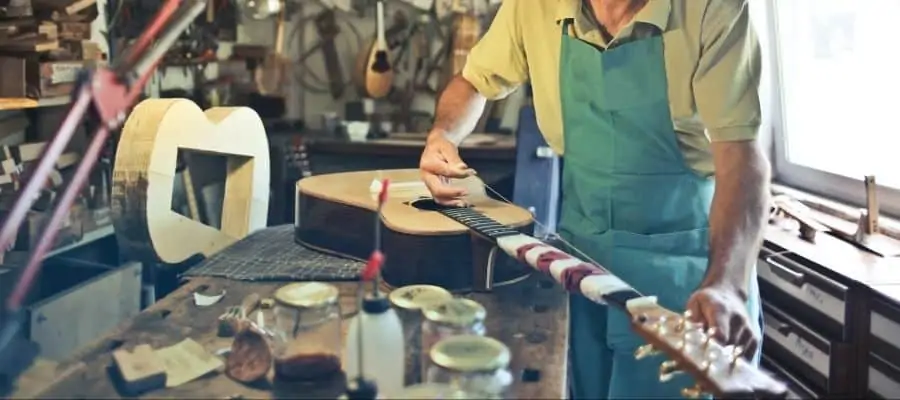
A skilled luthier can re-fret a guitar a near-limitless number of times. But, after 2 or 3 complete refrets, the slots cut for the frets will be widened by the extraction process. So from this point forward, the frets will always need to be glued in.
Many guitar techs already use glue on the initial installation of frets and the first couple of frets replacement jobs. So this will not be much of an issue for your local repair shop.
Once the slots become widened, different fret models have to be used to replace your old frets to prevent the slop in the refitting from allowing the new fret to sit closer or further from the nut than when originally installed.
Frets are made with a thicker tang just for this purpose. Some of the luthiers change standard frets by making the tang wavier, so it takes up more space.
Although it will challenge the repair shop and more quickly wear out their tools, many would suggest you have stainless steel frets installed with your re-fret job.
They should last at least 3-4 times as long as traditional nickel-based frets.
Does String Size Matter?
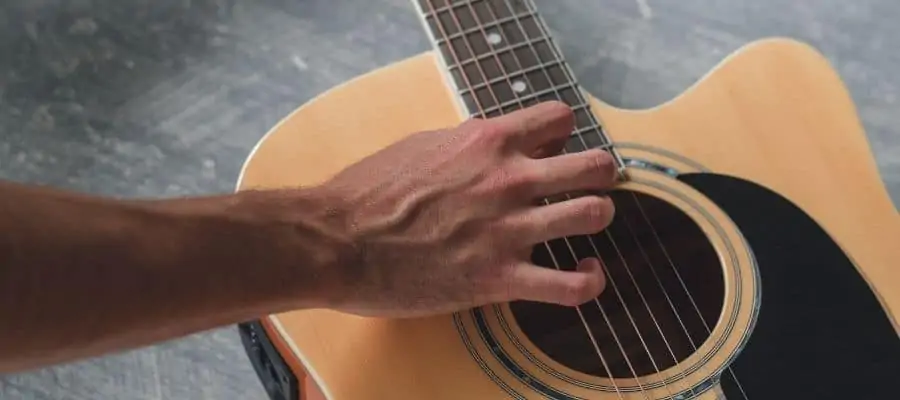
Yes, again, like with more or less all things mentioned above, the string size is something to consider when talking about fret wear.
The main factor of fret wear is the finger pressure that comes to the frets with the strings. There are two important points about this pressure; the first one is how hard the strings are pressed against the frets, while the second one is the contact area between the frets and the strings.
Suppose the finger pressure is constant as the player is the same; in that case, smaller strings will cause smaller damage to the frets as the contact area gets smaller. When the strings are bigger, causing the frets wear out faster.
Here we also have to take the string action into account. If you are using a lighter gauge string and lower action, you can use less finger pressure to create clean notes. This way, you can also play faster and longer without your hands and fingers getting sore.
If you are using heavier strings and higher action, you will need to use more finger pressure on the strings against the frets as the string tension increases. This becomes easier to feel when you play bends and vibratos. Again when you use more finger pressure, you will end up with faster-wearing-out frets.
We see there are a LOT of things to have in mind when talking about how long guitar frets last, but there are certainly some tips you can do to prevent frets from wearing.
How To Prevent Fret Wear?

First of all, if you can buy a guitar with stainless steel (SS) frets on it. If you already have a guitar and your frets are nearly dead, on your fretwork, put SS fret. They will not last forever but will last you much longer than any other frets.
Second, if you can, adjust your playing style. Do not press on the fret too hard, sometimes, and for someone, this is not an option, but if you’re just starting, try to teach yourself to press softer on the frets. Both the frets and the strings will benefit from this.
If your playing style is aggressive, try to put Nickle strings on the guitar, they are softer than other string materials and just might do the trick for you.
Other things to consider, like I already wrote in this article, try to avoid using capos or slides in your playing cause they can seriously shorten your fret lifespan.
Store your guitars in a humidity-controlled environment; the best is in your case, but if you can’t or won’t do that, make sure that the room where you keep them is humidity-controlled.
Wash your hands before playing, and if you sweat a lot during your playing. Dirty, sticky, and sweaty hands are bad for your frets, strings, and your performance.
Conclusion
Frets are consumables. They’re like printer ink, fuel, or glue. So, they serve you for a time to get the job done until they wear out. Sometimes, this can happen faster, and sometimes it happens after several years. But, the most important point is to not worry about this a lot that it affects your playing.
If you are serious about playing guitar, you will need some fretwork eventually. The article tells you why and how this happens for you to understand your playing and your instrument better. Do not take fret for granted but also do not let the fret wear risk to alter your playing.
If you found this article useful, you may want to save this pin below to your Guitar board.

One thought on “How Long Do Guitar Frets Last And How To Prevent Fret Wear?”
Leave a Reply
Recent Posts
Some guitarists insist on buying an expensive amplifier with their electric guitar. They assume that this is a must for every type of guitarist out there. However, in some situations, this isn’t...
Top 50 Free Realistic Guitar VST Plugins With Sound Examples
As technology has rapidly advanced in the recent decade, computers are stealing more and more roles from physical musical instruments and accessories. Nowadays, you do not need expensive amps,...

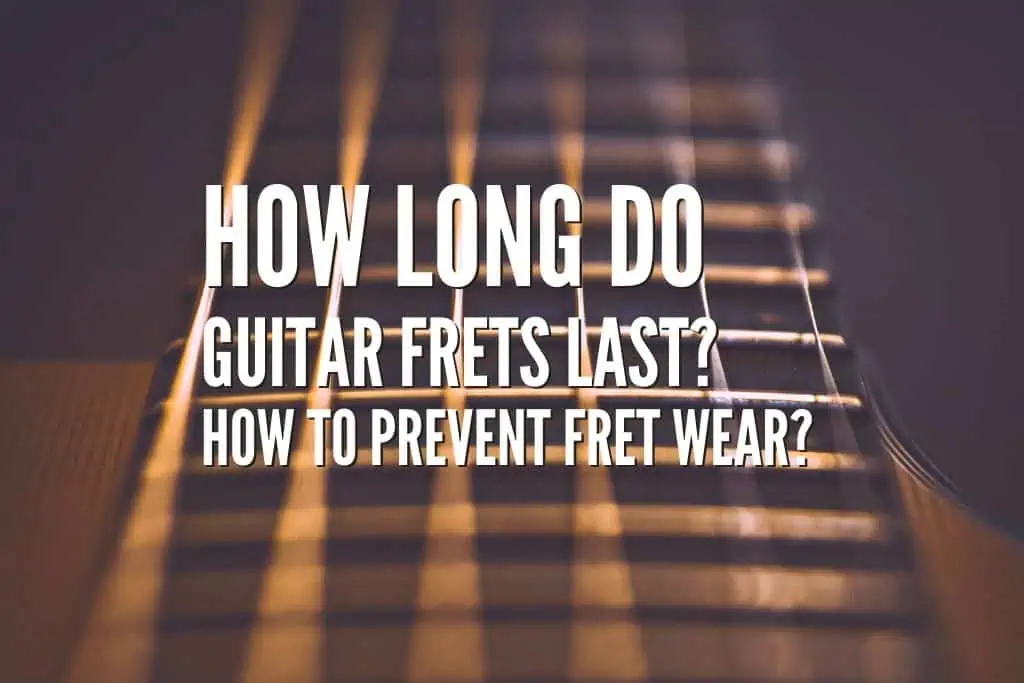
That was a well written article on frets.
Thanks for taking the time to write it.